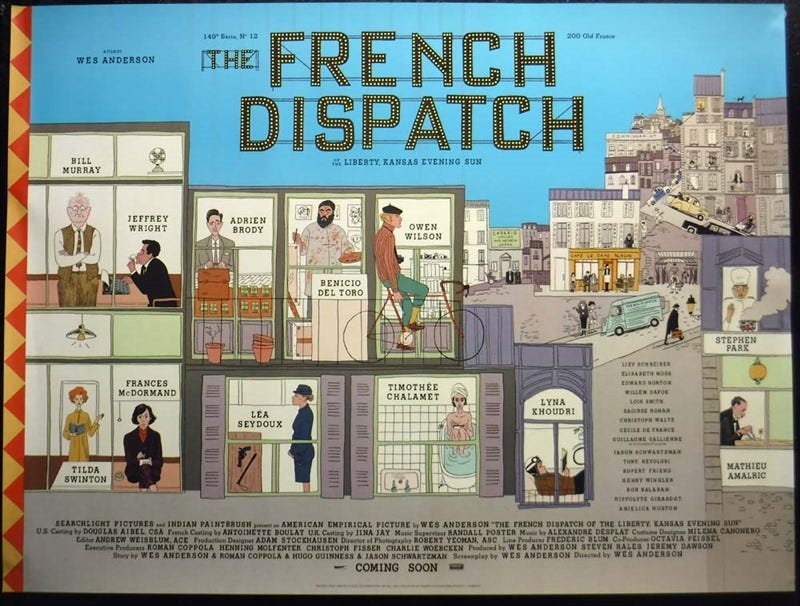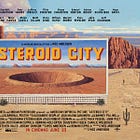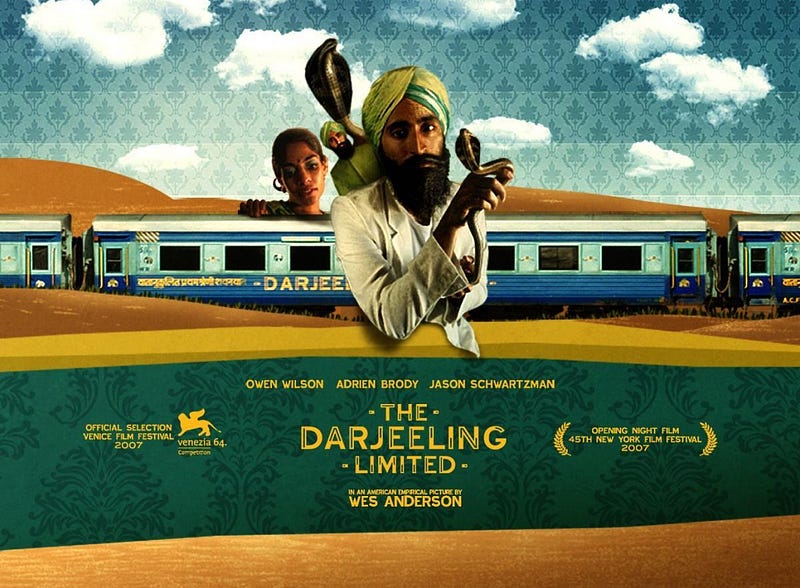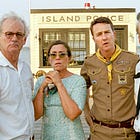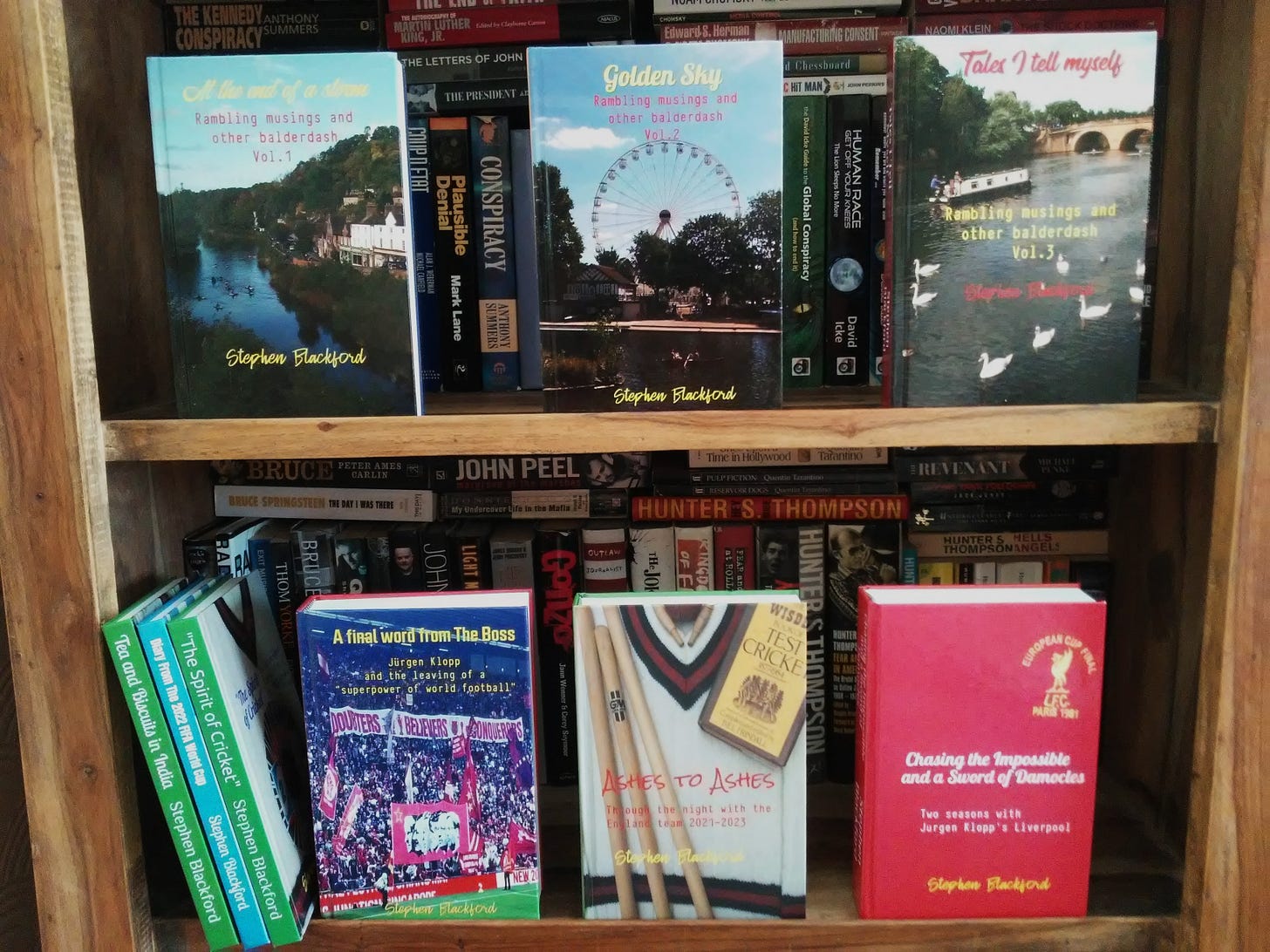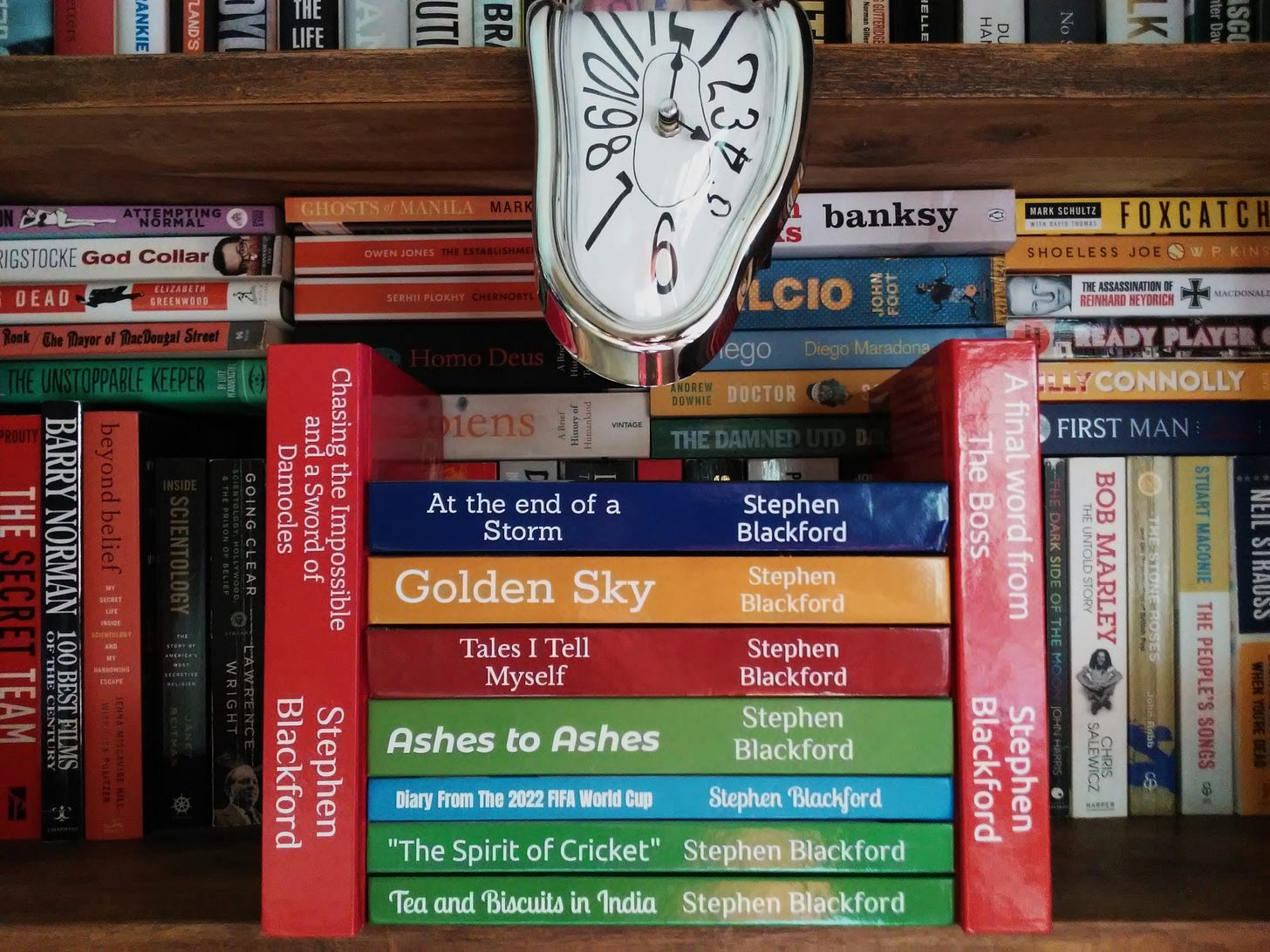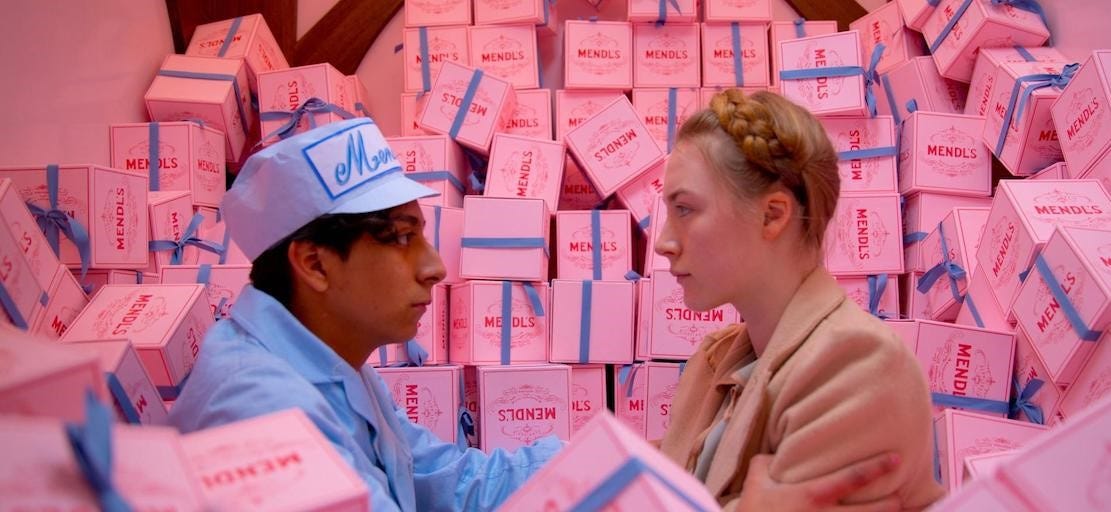
It’s 12.27am here in the UK and early on a Sunday morning after the Saturday night at the Movies of before and I’ve just made the hideous mistake of checking my Twitter feed and holy moly, someone has shot Donald Trump. The Matrix has gone all weird again. Well, more weird than normal. The shooter will be a “loner” with 3 names, but probably not Lee Harvey Oswald but you never know. Blimey. The Matrix has gone all weird again.
What does this have to do with my spoiler free review of “The Grand Budapest Hotel” and the third in my triple bill of cinematic delight? Absolutely nothing come to think of it but here’s a video of a strange looking man in a Radiohead t-shirt singing a Radiohead song which has absolutely no connection to this film whatsoever and quite frankly perfectly fitting for such a weird night of bad craziness in The Matrix.
See you on the other side.
“I’m afraid that’s me darling!”
I consider myself very fortunate to see Wes Anderson’s eighth film just after opening night at my local picture house and instantly fell in love with it. For personal reasons only I rank it second in my all time personal favourite films of his but sixteen years after “Rushmore” it truly runs it close for my all time favourite. “The Grand Budapest” Hotel is far more elegant, poetic and picturesque than Rushmore and I adore the comic book/picture book feel of the film. It’s timeless flow and imagination makes an instant re-watching an easy decision, especially when you consider the film itself is almost a film within a film, within a film. The three separate time periods of 1985, 1968 and 1932 flow together seamlessly and whilst the film may be predominantly set in the 1930’s the movements forward in time are never jarring or awkward and simply add to the majesty of this wonderful film. As I write this ode to joy on 1st October 2014 the Oscar buzz has not yet started but surely this is the breakthrough film of Oscar recognition Wes Anderson has thoroughly deserved since the eponymous Rushmore sixteen long years ago. Whilst Oscars are not the yardstick by which to measure a film’s success, we can but hope.
The film is inspired by the writings of Stefan Zweig (who is thanked in the closing credits) but Anderson and fellow writer Hugo Guinness deserve an Oscar nomination for their surreal screenplay and for the poetic, dancing dialogue given to Ralph Fiennes and Jeff Goldblum, both of whom pull of their linguistic treats to perfection but more of this later. Robert Yeoman’s cinematography is again inspired, adding to the picture book texture of the film and combined with Adam Stockhausen’s production design and miniature models provide so many endearing and effective cinematic shots that deserve Oscar recognition in 2015 but the same can be said for Milena Canonero’s wonderful array of costumes that truly are a centre piece of the film, Anna Pinnock’s set decoration and Stephen Gessler’s art direction are all worthy of recognition and in Oscar circles, if it’s The Grand Budapest’s year in 2015, all will be worthy recipients of the prized statue. The film is such an incredible achievement Wes Anderson’s entire behind the scenes crew deserve special praise for realising an astonishing looking film that enchants you with every watch, but a final nod goes to Film Editor Barney Pilling for weaving together three differing timelines, so many narrative strands and of course, the long held Wes Anderson trademarks which proliferate the film and work so wonderfully well as ever.
In front of the camera is a real ensemble cast of returning actors from previous Anderson films or A-List first timers that each portray highly original character creations that I will briefly appraise below. But to whet your appetite we have, in no particular order:
a dastardly double dealing Frenchman, a vicious German enforcer, a spurned son, a pompous writer, a heavily tattooed yet loquacious prison inmate, an equally loquacious lawyer, a bizarre local Captain of the Military, a beautiful pastry chef, several surreal concierges, one strident, wistful, foul mouthed yet sweet tongued lothario who also occasionally acts as a concierge, oh, and a Lobby Boy named “Zero”! All of whom are in the very capable hands of Ralph Fiennes, Adrien Brody, Bill Murray, F Murray Abraham, Willem Dafoe, Harvey Keitel, Jeff Goldblum, Mathieu Amalric, Edward Norton, Jude Law, Saoirse Ronan, Tilda Swinton, Tom Wilkinson, Tony Revolori, and returning favourites Owen Wilson and Jason Schwartzman.
The opening frame of the film sets the tone and immediately you’re aware this is a Wes Anderson film. All three time periods of 1985, 1968 and 1932 were shot in different aspect ratios to suitably reflect the change in period so don’t adjust your set! The film has a continuing narration throughout however the narrator changes with the time period and firstly in 1985 we have the bizarre spectacle of “Author” (Tom Wilkinson) narrating direct to camera whilst being shot at by his son with an air gun!. We now jump back to 1968 and the second of our narrators “Young Writer” (Jude Law) who details the demise of the once opulent and highly regarded Grand Budapest Hotel, located in Zubrowka, a fictional European town high in the hills and formerly a hive of activity that attracted only the very wealthy prior to the outbreak of war in the 1930’s. But here in 1968 it is now rather decrepit and a monument to a bygone age but which still retains it character and remnants of it’s more luxurious past and now houses singular visitors who keep themselves to themselves whilst passing through. The Young Writer is wont to stand “elbow to elbow” of an evening with “M.Jean” (Jason Schwartzman) the hotel’s current incumbent in the role of concierge and the returning Schwartzman is excellently bizarre in a small cameo role. M.Jean alerts the young writer to the exception to the visitors who pass nominally through the hotel, “Mr Moustafa” (F Murray Abraham) the current owner of the hotel, and through “fate” the young writer is able to ask the scene setting question to Mr Moustafa of how he came to own such a grand building with such grand history and with such a grand tale to tell? The particular tale Mr Moustafa tells is of intrigue, suspense, murder, philandering and of colourful characters in very colourful and bizarre circumstances. It’s also a tale of young love, a Lobby Boy named Zero and a loquacious concierge who came to own the priceless painting of “Boy With Apple” and the story is told, indeed narrated, over an evening meal between the two men as they dine in the huge, imposing dining hall of the Grand Budapest Hotel.
Wes Anderson’s masterpiece is split into five parts (each with it’s own title slide, naturally) and are occasionally preceded by a slight change in the colour palette of the film. All Anderson hallmarks are present and correct: overhead shots, extreme close ups on books, paintings, newspapers, sepia tinged photographs, together with beautiful rolling camera shots, surreal inserts (look out for the cloakroom ticket!), plus there’s the obligatory “man hanging out of a window” shot that has appeared in nearly all of his films. The picture book style of the film is an absolute joy, the narrative blending with the bizarre character creations perfectly and every frame has been meticulously planned to the nth degree. But what impresses me time and time again in Anderson’s eight cinematic offering are the small segments of scenes not seen in his previous works. The multi doors sweeping open as we approach the reading of the will and “Zero” (Tony Revolori) about to commence the obligatory reading of the concierge letter and poem before the staff’s evening meal but an instant cutaway to an imprisoned “M.Gustave” (Ralph Fiennes) and his surreal reading of the letter whilst surrounded by unemotional fellow inmates and prison officers are two examples of many. The chase in the Kunstmuseum is just phenomenal and a credit to the genius Director of Photography Robert Yeoman, as is the prison escape sequence and only surpassed by the acting and prose delivered by Tony Revolori and Ralph Fiennes at it’s touching, yet amusing denouement.
These are but minor examples of so many brilliant scenes devised and shot through the prism of Messrs Anderson and Yeoman lens but even these are topped by a Wes Anderson staple, but with a twist! The film’s touching love story centres on Zero and the beautiful “Agatha” (Saoirse Ronan) and during their early courtship they enjoy a merry-go-round ride that is simply shot and ended with an Anderson hallmark of a straight on extreme close up on Agatha but rather than an unemotional shot (as is the norm) she is bright eyed and smiling.
All five parts or acts of the film are an absolute joy, and here’s a very brief dissection of a very colourful cast of characters:
“M.Gustave” (Ralph Fiennes) Busy yet meticulous concierge of The Grand Budapest Hotel in the 1930’s who has a penchant for fine wine, blonde haired older ladies and L’air de Penache’. Has a wonderful linguistic use of English and a lothario who calls everyone, regardless of sex, as “darling”.
A stellar performance worthy of a 2015 Oscar.
“Zero” (Tony Revolori) Zero experience and zero family and friends. Deeply in love with his beloved Agatha but don’t you dare flirt with her! Following numerous roles in TV and short films, this is Tony’s first major role and many more are sure to follow this accomplished performance.
“Young Writer” (Jude Law) Well spoken writer, English Gentleman, European traveller and one of the film’s numerous narrators who’s told an incredible tale in an incredible dining room in an incredible film.
A cameo yet important role from Law.
“Mr Moustafa” (F Murray Abraham) Quiet and unassuming owner of The Grand Budapest Hotel who remains utterly devoted to Agatha, deeply misses his “Agatha” and has an intriguing tale to tell.
It maybe a cameo role but it’s F Murray Abraham — what else do you need to know?
“Agatha” (Saoirse Ronan) Owner of Zero’s heart, saviour and bravest of the film’s eclectic and surreal cast of characters and she’s far more than a mere “pastry chef”. Atonement, The Lovely Bones and now The Grand Budapest Hotel, Ronan’s star is on the rise and justifiably so.
“Henckels” (Edward Norton) Surreal Captain of the Local Military who is big on moustaches, quizzical looks and very definitely not “Little Albert” anymore! A priceless cameo from the ever dependable Edward Norton.
“Nobody move. Everybody’s under arrest!”
“Ludwig” (Harvey Keitel) Heavily tattooed prison inmate who can see the vulnerability of their “flophouse” and impresses M.Gustave with his artistic talents. Only included here as he’s a cherished actor I greatly admire and can drive any distance in just nine minutes and thirty seven seconds!
“Deputy Kovacs” (Jeff Goldblum) An eloquent, elegant and operatic cameo from a deadpan and utterly brilliant Goldblum as a conflicted but straight as a die lawyer. But please, don’t mention his cat!
“Dmitri” (Adrien Brody) Angry, very, very angry spurned son of a wealthy departed blonde lady who’s missing a priceless painting. As eloquent as his fellow characters but with a rather more foul mouth than the rest, even in front of his sisters! Yet another superb performance from Brody in an Anderson film.
“Jopling” (Willem Dafoe) Ruthless family enforcer who is also a remarkably accomplished motorbike rider and Olympic skier! An almost wordless performance but there’s nothing quiet or subtle about Jopling’s methods of disposal. Another returnee to an Anderson film and another accomplished and important cameo from Dafoe.
Supporting these premier roles are many more fleeting and cameo roles from Mathieu Amalric as a strangely staring French concierge “Serge X”, Bill Murray as the ever helpful “M.Ivan”, Jason Schwartzman as the comical concierge “M.Jean”, Tilda Swinton as the ill fated and fabulously wealthy “Madame D”, Owen Wilson as concierge “M.Chuck”, Florian Lukas as “Pinky”, Karl Markovics from the utterly brilliant and highly recommended film of 2007 “The Counterfeiters” as “Wolf”, a returning Bob Balaban as “M.Martin” and fellow returnees to a Wes Anderson film of Wallace Wolodarsky as concierge “M.George” and Waris Ahluwalia as concierge “M.Dino”.
A truly stellar ensemble cast in a wonderfully spellbinding film that showcases the very best in director Wes Anderson. I cannot recommend his films highly enough and The Grand Budapest Hotel may be his best yet and come 2015, hopefully he will receive further Oscar recognition to go with this particular film fan’s total admiration for his vision and desire to produce visually stunning pieces of cinematic art.
“The Grand Budapest Hotel” can also be found singing and dancing within my 7 volumes of “Essential Film Reviews Collection” on Amazon, with all volumes free to read should you have an Amazon Kindle “Unlimited” package. Whilst you’re on my Amazon page, why not treat yourself to one of these fantastic self-published books too!
"The Essential Film Reviews Collection" VOL.7 - link to Amazon
Thanks for reading. I hope this message in a bottle in The Matrix finds you well, prospering, and the right way up in an upside down world.





